高中英语 Unit1 Grammar1 重庆大学版必修3
高一英语 Unit 1 Grammar课件 重庆大学版必修3
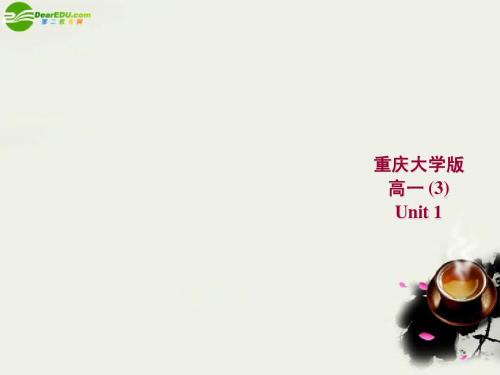
The party was organized without her knowing anything about it.
高考链接
1. Listen! Do you hear someone _______ A for help? (湖南 2010) A. calling B. call C. to call D. called 2. They use computers to keep the traffic _______ smoothly. (2009全国卷II) D A. being run B. run C. to run D. running
3. Peter received a letter just now C ______ his grandma would come to see him soon. (四川2007) A. said B. says C. saying D. to say
D. The news is / sounds exciting. 做主语补足语
5 She was angry to find her son ________ smoking (smoke). Function
做宾语补足语
6 People _____ (live) in this street living are mostly from Germany. Function 做定语
Underline the “ing” participle in the following passage and tell what function each of them has. 定 语
My father was a loving and devoted son to my grandparents. He made sure they were happy and comfortable. He wanted them to be宾 语 us so he was with sure of their well-being. A year ago, my grandfather fell ill.
高中英语必修3 unit 1 Grammar

2. ---Where is Emma? ---I can’t say for sure where she is, but she___ be out shopping. A. can B. should C. must D. D may
3. The room is in a terrible mess; it ____ cleaned. A. can’t have been A B. couldn’t be C. may have been D. would be
课标人教实验版 高一 Module 3 Unit 1
Grammar
情态动词的语法特征
1) 情态动词 不能单独做谓语,除 ought 和have 外,后面只能接不带to 的 不定式。 2) 情态动词没有人称,数的变化,但有些 情态动词,如can、will也有一般式和过去 式的变化。 3) 情态动词的“时态”形式并不是时间区 别的主要标志,不少情况下,情态动词的现 在式形式和过去式形式都可用来表示现在时 间、过去时间和将来时间。
can 和could: 1) can的主要用法是: A. 表示体力或脑力的能力: eg. The girl can dance very well. B. 表示说话的推测﹑事物的可能性等: eg. Can the news be true? C. 在口语中, can可以表示请求或允许: eg. Can I sit here?
3. A: _____ I go with my friend to the May harvest festival? B: Yes, you _________________ may go ( with your ________. friends ) 4. A: If I want to be a doctor _______ I should study science?
最新-高一英语 Unit 1 Language focus课件 重庆大学版必修3 精品
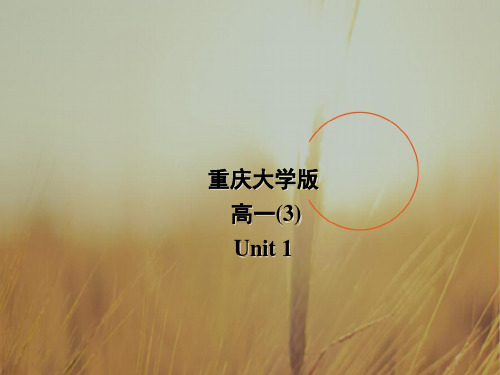
be动词之后; not any longer 在句末。
He no longer read bond is no longer a dependency of the USA. 这个小岛不再是美国的属地。 (在be动词之后)
7. People from the United States may at first seem friendly. at first 最初, 首先, 开始时候
At first I didn't know what had happened. 起先我不知道发生了什么事。
8. If the same two persons meet again by chance, even years later, they pick up the friendship where it left off and are delighted.
程度
We saw him no more = We didn’t see him again. 我们再也没有看到他。
6. Studies show that one out of five American families moves every year. 英语“若干分之一”常可写成“One in+数词” “one out of+数词”或“one of+数词”,作 主语时谓语动词一般用单数。
what’s happening or what to do. F. without deep affection; not close G. a person who spends time with
another. H. sth that joins or unites; connection
Book 3 Unit 1 Grammar

英语
必修3
Unit 1 Friends Varieties of Friends Grammar
He or she was the first, the only friend 先行词 (who/that) we told our secrets to. 关系代词 定语从句 定语从句(attributive clause)在整个句子中 担任定语,修饰一个名词或代词,被修饰 的名词或代词叫先行词。定语从句通常出 现在先行词之后,由关系词(关系代词或 关系副词)引出。 who, whom, that 指代人,在从句中作主语、 或宾语或表语。
1. This is the first science book _____ I have ever read. 2. It is the shortest story _____ I have ever read. 3. I have never seen places and people _____ are so beautiful. 4. This is the last thing ____ I did yesterday. 5. This is the very job _____ I am looking for. 6. Who is the boy _____ is sitting over there. In these situations, we only use “that” .
He or she was the first, the only friend (who/whom) we told our secrets to.
friend 在从句中做 to 的宾语,所以 who/whom可以省略。
高一英语 Unit 1 Listening,Speaking and Writing课件 重庆大学版必修3
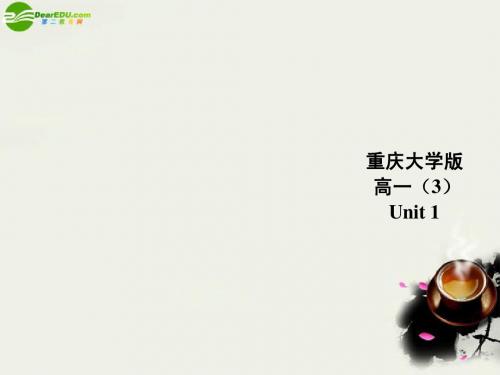
4. Listen to the passage again and decide whether each of the following statements is true or false. Correct the false one. 1) When making friends with Americans, you should invite them to parties.
Discuss and share your ideas with your
partner. Then write your own sentences
about a true friend and true friendship.
If possible, you can write more than one
an American, who is puzzled by the
Chinese way of treating friends.
You can make up your conversation
according to following cues. 1) A (a Chinese) and B (an American)
you. 他乐意帮助你。
take the first step
迈出第一步
Man has taken the first
step to the universe.
人类已经向宇宙迈出了
第一步。
approach vt. 接近,靠近 n.方法,方式;态度
高中英语重大版必修三课件Unit1Grammar1(共34张)
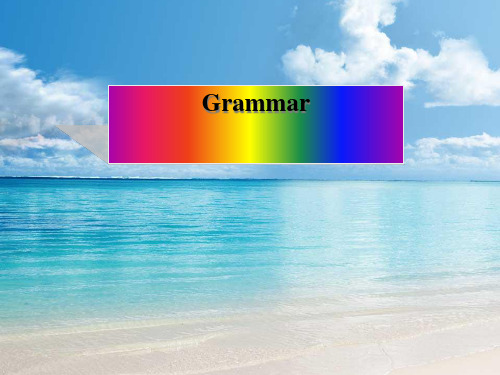
总结
1. must与have to的区别 have to比较强调客观需要, must着重说明主观看法。另 外have to能用于更多时态, 比较下面的句子:
We had to be there at 10:00. 有时两者都可以用, 意思差别不大。
e. g.
We must/have to leave now. must在表示说话人对事物的推测时 候要注意它比may肯定得多, 相当于 汉语的“一定”或“准是”。(只有 在肯定句中能这样用。)
There may be some dangerous animals on the island.
4.should(想必)
They should be there by now.
5.如果对过去发生的事情的推测 要用完成时。
Someone must have opened the cage. The lion couldn’t have escaped on its own.
You should answer my question in English. 你应当用英语回答我的问题。 They shouldn't be so careless. 他们不该如此粗心。
It's raining hard. You should drive slowly. 雨下得很大。你开车要慢些。
3) A: The flight to New York should be leaving in a few minutes.
B: Are you sure? 4) A: Sally, you should be careful
when you go out at night. B: OK, I will.
Further Reading
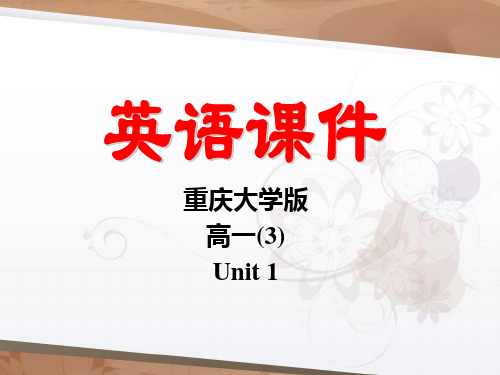
1. Look at the following pictures and work with your partner to describe the friendship shown in each one.
Friendship between adults
嫉 妒
2) The government denies that any of its territory is under rebel control.
疆域
4)A feeling of deep sadness or regret is called sorrow.
悲哀
5)A statue is a large sculpture of a person or an animal, made of stone, marble, bronze or some other hard material.
雕像
6) When you wrap something, you fold paper or cloth tightly round it to cover it completely.
包装
1. Read the text carefully and answer the following questions in complete sentences.
time.
2) What were the author and her husband
a little worried about when their
neighbour asked them if they would
like to have a kitten?
高中英语 Unit1 Further reading课件 重庆大学版必修3
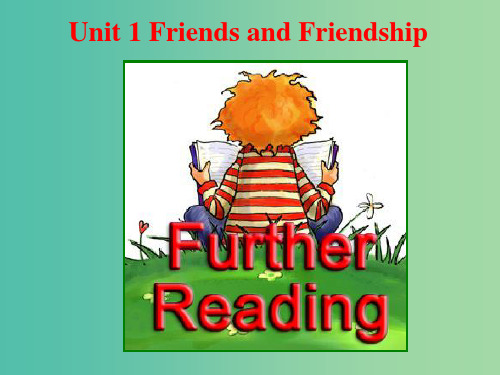
take a kitten.
A. experience B. have a try
C. make
D. take a chance on
3) Sam and Lightning were very
cautious with each other and kept
their distance.
A. frightened B. friendly
悲哀
5)A statue is a large sculpture of a person or an animal, made of stone, marble or some other hard material.
雕像
6) When you wrap something, you fold paper or cloth tightly round it to cover it completely.
1) If something unpleasant eases, it is reduced in degree.
减轻
2) If a room or something such as a seat is occupied, someone is using it, so that it is not available for anyone else.
Suddenly a man rushed out, crying loud for catching a thief.
3. Discuss the following questions with your partner.
1. In the sentence “It seemed nothing could ever happen to change that”, what does “that” refer to? “That ” refers to very special bond Sam and the author developed.
重庆市梁平实验中学高中英语 Unit1 Grammar课件2 重庆大学版必修3
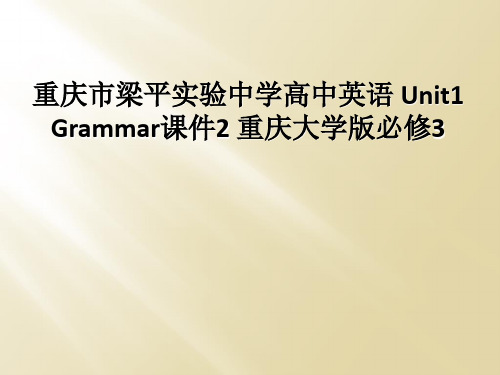
高考例析 1. Sorry I’m late. I _____ have turned off the alarm clock and gone back to sleep again. (2000 北京春季)
A. might B. should C. can D. will
答案为 A。表推测的用法。句意:对不起, 我迟到了。我(当时)兴许是关了闹钟又回去睡觉了。 might 相当于 may, 但语气更加不肯定。
3) He must have been to the Great Wall, hasn't he?
对已发生的过去情况的推测,若陈述句谓语部分有“must have done”,若没有表示过去的时间状 语,问句部分用haven’t 或hasn’t .
这个房间昨天肯定被清扫了。 The room _____ _____ _____ ______ yesterday.
--Where is John? Could he have gone to the playground?
--No, he can’t have gone to the playground. It is raining.
may/ might have done
Suggesting that it is possible that something happened or was true (used only in positive/ negative sentences)
4. — Tom graduated from college at a very young age. — Oh, he ____ have been a very smart boy then. (04 全国IV)
必修三Unit1Grammar教案
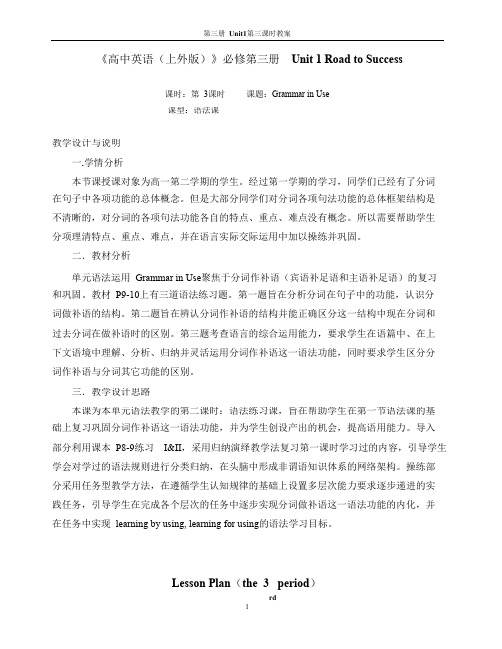
《高中英语(上外版)》必修第三册Unit 1 Road to Success课时:第3课时课题:Grammar in Use课型:语法课教学设计与说明一.学情分析本节课授课对象为高一第二学期的学生。
经过第一学期的学习,同学们已经有了分词在句子中各项功能的总体概念。
但是大部分同学们对分词各项句法功能的总体框架结构是不清晰的,对分词的各项句法功能各自的特点、重点、难点没有概念。
所以需要帮助学生分项理清特点、重点、难点,并在语言实际交际运用中加以操练并巩固。
二.教材分析单元语法运用Grammar in Use聚焦于分词作补语(宾语补足语和主语补足语)的复习和巩固。
教材P9-10上有三道语法练习题。
第一题旨在分析分词在句子中的功能,认识分词做补语的结构。
第二题旨在辨认分词作补语的结构并能正确区分这一结构中现在分词和过去分词在做补语时的区别。
第三题考查语言的综合运用能力,要求学生在语篇中、在上下文语境中理解、分析、归纳并灵活运用分词作补语这一语法功能,同时要求学生区分分词作补语与分词其它功能的区别。
三.教学设计思路本课为本单元语法教学的第二课时:语法练习课,旨在帮助学生在第一节语法课的基础上复习巩固分词作补语这一语法功能,并为学生创设产出的机会,提高语用能力。
导入部分利用课本P8-9练习I&II,采用归纳演绎教学法复习第一课时学习过的内容,引导学生学会对学过的语法规则进行分类归纳,在头脑中形成非谓语知识体系的网络架构。
操练部分采用任务型教学方法,在遵循学生认知规律的基础上设置多层次能力要求逐步递进的实践任务,引导学生在完成各个层次的任务中逐步实现分词做补语这一语法功能的内化,并在任务中实现learning by using, learning for using的语法学习目标。
Lesson Plan(the 3 period)rdLearning Objectives:By the end of the period, the students are expected to:1. have the ability of classifying and summarizing grammar rules of -ing / -ed forms as complements;2. form the network of -ing / -ed forms as complements in mind so as to distinguish them from other functions of -ing / -ed forms;3. skillfully apply -ing / -ed forms as complements in listening, reading and writing.Learning Procedures:Step I. Revision (Interactive activity)*T: Help the students recall and classify what they learned in the first period of Grammar in Use with the help of Exercise I & II on P 8-9.*Ss: Recall the grammatical rules of -ing / -ed forms used as complements by category.I. -ing form used as complements:feel / hear / listen to / see / watch / look at / notice / observe ... + O. + doing (O. C.)S.+ be felt / heard ... + doing (S. C.)discover / find / smell / catch ... + O. doing (O. C.)S. + be + discovered ... + doing (S. C.)get / have / keep / leave / send / set / start ... + O. doing (O. C.)with + O. + doing (O. C.)II. -ed form used as complements:see / hear / watch / find / feel / consider ...+ O. + done (O. C.)S.+ be seen ... + done (S. C.)get / have / keep / leave / make ... + O. + done (O. C.)declare / like / need / order / want / wish ... + O. + done (O. C.)with + O. + done (O. C.)Note: After working non-stop for twenty hours, he went to bed tired and hungry. (O. C.) The athlete went away quite satisfied with the result of the match. (O.C.)Step II. PracticeI. Identify - ing /- ed forms as complements in the lyrics (Task 1)*T: Play the song “Those Sweet Words” and ask students to identify - ing /- ed forms as complements in the lyrics while enjoying the melody. And then focus on the functions of -ing / -ed forms in “Iknow I saw you saying it.” and “I just h ave to hear t hose sweet words s poken like a melody.” and the meanings of the two sentences.*Ss: Identify - ing /- ed forms as complements and translate the two sentences into Chinese.Those Sweet WordsBy Norah JonesWhat did you sayI know I saw you saying itMy ears won't stop ringingLong enough to hearThose sweet wordsWhat did you sayAnd now the dayThe hour hand has spunBefore the night is doneI just have to hearThose sweet wordsSpoken like a melodyAll your love...II. Apply -ing / -ed forms as complements in individual sentences. (Task 2)*T: Ask students to identify the structure of -ing / -ed forms as complements in the following sentences and then fill in the blanks with proper forms of the verbs given in the box. Call students’attention to the differences between -ing forms as complements and -ed forms as complements.*S: Read the sentences silently and underline the structure of -ing / -ed forms as complements in each sentence and then fill in the blanks with -ing forms or -ed forms based on grammar rules of the differences between -ing forms as complements and -ed forms as complements.III. Apply -ing / -ed forms as complements in a passage. (Task 3)*T: Ask students to read a short passage and fill in the blanks with the -ing / -ed forms of the verbs given in the box. Then circle the ones that are used as complements. Call students’ attention to the differences between -ing / -ed forms as complements and -ing / -ed forms for other functions.*S: Read the short passage silently and circle the structures of -ing / -ed forms as complements in the passage and then fill in the blanks with -ing forms or -ed forms based on grammar rules of the differences between -ing / -ed forms as complements and -ing / -ed forms for other functions.IV. Apply -ing / -ed forms as complements in writing sentences. (Task 4)*T: Ask students to read each sentence in Chinese carefully and make out which category of -ing / -ed forms as complements fits the contexts best based on the given word in the brackets. And then translate the whole sentence into English.*S: First, make out and write down the proper structure of -ing / -ed forms as complements. Then, translate the whole sentence into English.。
重庆大学版高考英语一轮复习必修3 Unit 1 课件
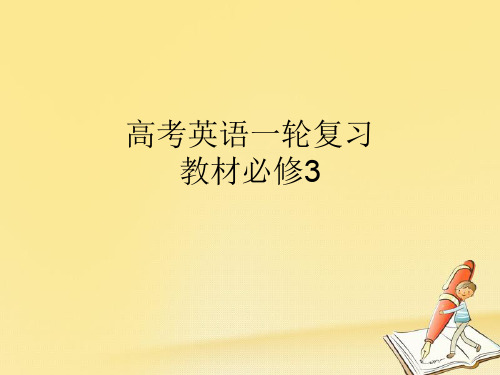
permanently blind and deaf. 在她十九个月大时,因为一次高烧使她永久失明和失聪。
(1)attack sb./sth. with sth. be attacked with
made him very disappointed but also disappointed his
parents.(disappoint) 7.A wealthy merchant founded a special foundation to
award scientists who make great achievements in their fields. But many years went by, no one knows exactly who the _f_o_u_n_d_e_r_ is.(found)
明句式
学仿写
2.I left the well-house, eager to learn. 我离开汲水房,渴 望学习更多的东 西。
形容词 (短语)作 状语。
女孩激动又欣喜 地跑向她的妈 妈。 _E_x_c_it_e_d____a_n_d__ _o_v_er_j_o_y_e_d___,
the girl rushed
2.The doctors had given her up but she made an excellent _r_e_c_o_v_e_r_y_. It was a miracle that she recovered from her illness.(recover)
3.People usually think heart disease is connected with smoking. Do you believe that there's a connection between them? (connect)
重庆大学版高中英语必修三一单元课件reading(26张)
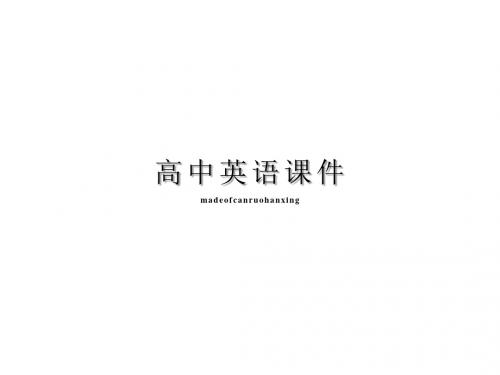
3) Yaser could not understand why Steve changed his attitude toward him. T
4) In the eyes of American people, friends may
be either close or not very close.
T
5) Friendship plays a more importantt role in
some cultures than in others.
T
6) In American culture, friendship means a strong lifelong bond between two people. F
comprehending
1 Read the text to decide which of the following
statements best summarizes how Americans view friedship.
1) American people think friendship should be a lifelong affair
never runs down. -- the one who comes in when the whole
world has gone out. -- a person who remaibs true and faithful
to us the whole life.
• A friend in need is a friend indeed.
高中英语课件
高中英语课件-book3 unit1 Grammar
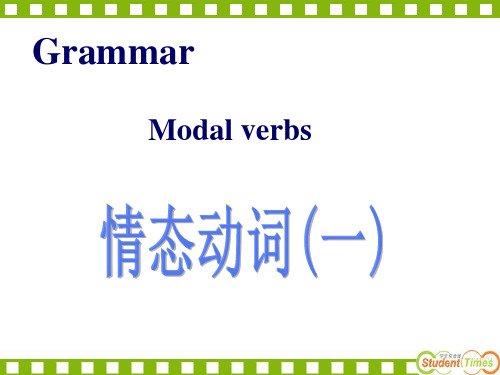
N_o_, _y_o_u_dt. (否定回答) 2)mustn’t表示禁止或不准。
You have worked hard all day. You must be tired. 你努力学了一整天了,一定累了吧。 He must be reading novels now. 他现在一定在看小说
practice:
When he was there, he ___w_o_u_l_d go to that tea house at the corner when he was free everyday.
The new law states that people __m_u_s_t_n_'tdrive after drinking alcohol.
was in college.
5. shall, should 1) 在一、三人称的疑问句中, shall用来
询问对方的意愿。如:
Shall we begin our lesson? When shall he be able to leave the hospital? 2) 用于二、三人称的陈述句中, 表说话人 命令、允诺等口吻
The road is wet. It must have rained last night. 路是湿的, 昨天晚上一定下雨了。
3) must 表示推测时, 只能用于肯定句。 4) must +be doing 表示对现在的动作进行肯定推测。 5) must +have done 表示对过去发生的事情 作出的肯定判断。
- 1、下载文档前请自行甄别文档内容的完整性,平台不提供额外的编辑、内容补充、找答案等附加服务。
- 2、"仅部分预览"的文档,不可在线预览部分如存在完整性等问题,可反馈申请退款(可完整预览的文档不适用该条件!)。
- 3、如文档侵犯您的权益,请联系客服反馈,我们会尽快为您处理(人工客服工作时间:9:00-18:30)。
You should answer my question in English. 你应当用英语回答我的问题。 They shouldn't be so careless. 他们不该如此粗心。 It's raining hard. You should drive slowly. 雨下得很大。你开车要慢些。
Modal Verbs (Ⅰ) must, may, should, will, have to
Studying the Rule
1) A: It’s hot, isn’t it? B: Yeah, but it may rain tomorrow.
2) A: May I sit on this chair? B: No, you mustn’t. A: Why not? B: Because it is broken.
e. g. He may know the answer. c. may用在感叹句中可表示祝愿、
愿望。 e. g.
May you succeed.(祝你成功。) May you have a pleasant journey.(一路平安。)
3. should是shall的过去式,它可以用 于过去时态中,但更多的是用作 情态动词,意思是“应当;应 该”,用来表示义务或责任。此 时,它不再局限于和第一人称的 代词连用,而是三种人称都能使 用。例如:
5) A: I have just walked 5 kilometers! B: You must be very tired now.
6) A: Will you give this to Elle, please? B: With pleasure.
7) A: It’s raining cats and dogs outside. B: Really? Then I have to take an umbrella with me.
should还可以用在提供帮助、提出建 议、要求、给予指示的句子中。 例如: Should I help you carry the basket? 要不要我帮你提篮子? What should I do for them? 我应当为他们做些什么? 应当注意的是,当should表示上述两 种意思时,要重读。
3) A: The flight to New York should be leaving in a few minutes.
B: Are you sure? 4) A: Sally, you should be careful
when you go out at night. B: OK, I will.
1. must与have to的区别 have to比较强调客观需要, must着重说明主观看法。另 外have to能用于更多时态, 比较下面的句子:
We had to be there at 10:00. 有时两者都可以用, 意思差别不大。 e. g. We must/have to leave now. must在表示说话人对事物的推测时 候要注意它比may肯定得多, 相当于 汉语的“一定”或“准是”A: Must I hand in the homework now? B: No, you don’t have to. You may hand it in tomorrow morning.
9) A: When are we going to leave the hotel?
B: We must leave the hotel before 6:00 pm.
5.如果对过去发生的事情的推测 要用完成时。
Someone must have opened the cage. The lion couldn’t have escaped on its own.
准是有人把笼子打开了,狮子不 可能自己跑出来。
一般疑问句的肯、否定回答
4. will 情态动词 aux. (客气提问)是 否愿意;…好吗 word that you say when you ask a polite question
·Will you pass the salt? 请你把盐递给我,好吗?
·Will you please give him a message when you see him? 你见到他时捎个口信给他好吗?
This must be your room. 在回答由must引起的问题时, 如 果是否定的答复,不能用 mustn’t, 而需要用needn’t或 don’t have to, 因为mustn’t是 “一定不要”的意思。
2. may的用法: a. 表示“允许”或“请
求”。 e. g. May I e in?
It can’t be Mr. Wang . He has left here. 3.may / might可用于肯定、否定句中
There may be some dangerous animals on the island.
4.should(想必)
They should be there by now.
·Won’t you e in and have a little tea? 要 不要进来喝点茶?
·Will you please lend me your rubber? 请借给我你的橡皮好吗?
表推测
1.must(一定)只用于肯定句中,
He looks so pale. He must be ill. 2.can / could用于肯定、否定、疑问句中,
在使用这一用法时需注意: may表 示“允许”的否定形式是must not, 意思是“不应该” “不许可”。e. g.
—May I take this book out of the reading-room?
—No, you mustn’t. b. 表示说话人的猜测,认为某一 事情“或许”或“可能”发生。
